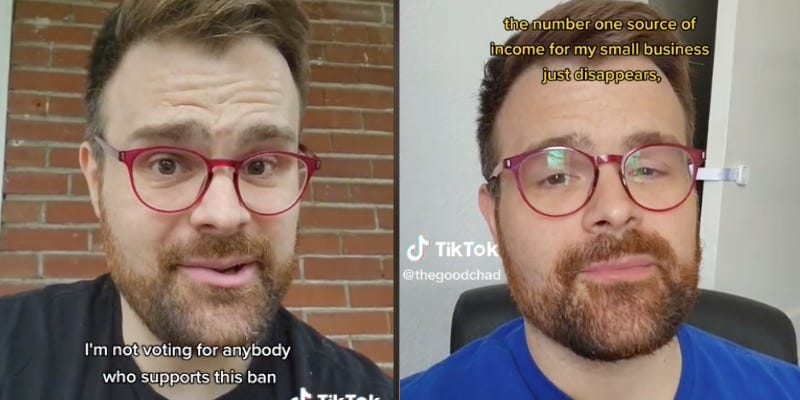Pivot to Instagram in TikTok Ban? One Business Owner Says No Way.

- Chad Spangler, 32, credits TikTok for bringing in $100,000 in sales for his business last year.
- He says a US ban of TikTok could crush his business, but he doesn’t want to pivot to Instagram.
- He blames Instagram’s parent company, Meta, for spreading disinformation about TikTok.
Chad Spangler is starting to worry about the future of his business.
The St. Louis-based 32-year-old works full time as an independent artist and content creator about his polyamorous lifestyle, which is when more than two partners engage in a consensual romantic relationship. He uses his platform to educate people about polyamory and discuss the struggles of transitioning from monogamy.
Spangler said the vast majority of his income comes from selling digital-art designs — primarily as apparel, stickers, and enamel pins — through his website and Etsy. Last year, his solo business generated over $103,000 in online sales, according to a document viewed by Insider. His take-home earnings were $36,000 after accounting for inventory-related costs, platform subscriptions, and other expenses.
The majority of his customers find him through TikTok, Spangler said, where he has over 237,000 followers across two accounts. In 2022, over 75,000 visits to his website came from a link in his more popular TikTok profile, according to a document viewed by Insider. Instagram was responsible for roughly 44,000 visits, followed by Facebook, Twitter, and Google at 2,000, 429, and 161 visits, respectively.
Spangler started selling his designs full time in 2021 after quitting his corporate job and said his wife is earning the majority of their household’s income while the business grows. His goal is to get back to the annual income level he had at his old job — roughly $57,000 — but he said he’s worried about one thing getting in the way: a TikTok ban.
“It’s not an exaggeration to say that TikTok is my livelihood,” he said. “The immediate impact of a TikTok ban would be a loss of my primary income source.”
Initially, Spangler said he wasn’t too concerned about the app being banned. But after TikTok CEO Shou Zi Chew’s appearance before Congress in March, “the feeling that the ban could actually happen sunk in.”
Lawmakers have raised concerns that TikTok’s Chinese parent, ByteDance, could give the Chinese government access to US user data, which means it could theoretically pressure TikTok to show or restrict certain content to American users for its own interests. Some experts say a ban is nearly inevitable, though a forced sale or spinoff — which would serve to isolate the company from Chinese government interests and alleviate some national-security concerns — could potentially allow the app and its users to continue business as usual. An outright ban would be bad news for many of TikTok’s 150 million active US users, including the nearly 5 million businesses, many of them small shops, the company says use the platform to reach customers.
Some narrower restrictions have already been implemented across the country. More than half of all US states have banned TikTok on government devices, which has led many public colleges to block TikTok from campus WiFi networks and university-owned devices. In April, Montana legislators voted in favor of a bill that would ban TikTok within state lines. The bill is pending approval from Gov. Greg Gianforte.
Why Instagram isn’t the backup plan
While Spangler has been on Instagram a year longer than TikTok, he has 102,000 Instagram followers — less than half the number of his TikTok followers — and he said it’s the second-biggest driver of sales for his business.
He’s trying to move away from Instagram and Facebook — and he’s giving his followers the heads-up. The reason: He’s no longer comfortable using Meta-owned platforms “because of their involvement with the spread of disinformation about TikTok.”
In March of last year, The Washington Post reported that Meta was paying one of the largest Republican consulting firms, Targeted Victory, to run a campaign intended to turn the US public against TikTok. Using a variety of measures — such as opinion pieces, letters to the editors, and stories about viral trends that supposedly started on the platform — the firm reportedly planted anti-TikTok content in small and large media outlets. Spangler said he believes these activities have unfairly characterized TikTok and helped fuel the scrutiny that has led lawmakers to consider banning the app.
“From my view, at best this is a shady business practice, and at worse an intentional effort to influence lawmakers,” Spangler said.
A TikTok spokesperson told the Post that the company is “deeply concerned” about “the stoking of local media reports on alleged trends that have not been found on the platform.” When asked about the report last year, a Facebook spokesperson told Insider that all platforms should face “a level of scrutiny consistent with their growing success.”
Spangler acknowledged that ditching Instagram would be a significant risk, however, and said that losing both TikTok and Instagram would “decimate” his income. That’s why he’s taken every step he can to ensure his business would survive without these platforms.
“I’m preparing for this as best I can by working on my YouTube channel and letting my current followers know that’s where I plan to be,” he said. “I’m also establishing a direct email list to best reach those who want to continue seeing my content.”
YouTube is a ‘more stable, long-term place for content to be seen’
Ever before the Post story came out last year, Spangler said he’d been working on building up his YouTube channel for two reasons: the longevity of content and the better pay rate compared to other platforms.
He said that the content he posts on YouTube shorts — the short-form section of the platform — have “behaved mostly the same as TikTok or Instagram reels,” initially getting a burst of views before leveling off fairly quickly. But contrary to TikTok and Instagram, he said, YouTube is also well suited for his long-form videos.
“YouTube is a great fit for me because any content I post can be served to people for years to come, giving my videos a much longer life span than other platforms,” he said. Spangler said a video he posted about a year ago about jealousy in polyamorous relationships continues to be his top-performing video.
When it comes to pay, Spangler said YouTube compensates him for his views at a rate much higher than TikTok or Instagram.
“YouTube’s longevity of content and the much better pay rate make for a much more consistent source of views and income,” he said.
Establishing his YouTube presence is still a work in progress, however. Spangler has roughly 8,000 subscribers on his most popular channel and said he’s working on a system that will enable him to post content more regularly.
But ideally, Spangler said, TikTok will avoid a ban and he won’t have to rely too much on a pivot to YouTube.
Spangler said that the RESTRICT Act, the bill making its way through Congress that could be used to ban TikTok nationwide, would give the US government a “terrifying level of power over our digital landscape.” He doesn’t think lawmakers realize how important the app is for many Americans.
“It feels like our government believes this app doesn’t matter and is simply for funny dances and memes,” he said. “The reality is it is an effective way for millions of Americans to reach each other, and in my case, a critical part of my small business.”


















